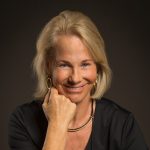After I googled Lisa Romeo—writer, essayist, writing coach, ghost writer, editor for two literary journals, MFA thesis director for Bay Path University, adjunct professor for another university, editorial consultant, presenter, freelance manuscript editor, wife, mother, and most recently, debut author of Starting with Goodbye, A Daughter’s Memoir of Love after Loss—I googled the term “work ethic.”
They should have just put Lisa’s picture on the page and called it a day. This hard-working writer managed to find time to pen a poignant memoir about rediscovering her enigmatic father after his death, which will be published by the University of Nevada Press this spring.
Lassoing her for lunch recently, I asked Lisa what it was like to go from writer to author, a long-awaited goal. — Ryder ZiebarthRyder Ziebarth
RZ: First of all, how did you even find time to write a book? When and how did you begin?
LR: In 2007, I began to write essays about the experience of my father’s death and what unfolded next for me. I love short forms of creative nonfiction—flash, braided essays, long narrative pieces, list essays—and I just kept experimenting. Fortunately, many were published.
The idea of a book came later, around 2012, and at first, I saw it as a linked essay collection. Publishers said nice things, but weren’t interested in that form. I put it aside for a few years, got some good advice (from authors I admire, and a consultation with a book coach), then in 2016, rewrote it as a more traditional linear narrative memoir.
If you asked me to show you on a calendar when I did the writing, I couldn’t. All I know is what I always do: manage to write my own projects around my work life. Just like for other writers with day jobs, that means a lot of weekend days, many late nights, some early mornings (not my favorite time of day!).
RZ: You’ve worn your hat with the Working Writer’s Life logo more than three decades. What’s it like making the transition to an Author’s logo and how does it feel?
LR: Frankly, odd.
For many of those years, I wasn’t seeking to become an author, not while working in public relations and freelance journalism, and then later, teaching. Yet I always saw myself as “writer,” who just happened to write short forms. It has always bothered me—especially at conferences—that there often seems an invisible but very clear and sometimes unpleasant divide between authors who “have a book” and writers who don’t.
When I was published exclusively in magazines, newspaper, literary journals, anthologies, and websites, that was still considered “unpublished” because I didn’t have a book with my name on the spine. This used to irritate me. I get that this is the industry criteria. But I have promised myself not to become one of those authors (you know the type) who dismisses writers who have not yet published in single-book form.
On the other hand, I now see that bringing a book from manuscript to traditionally published provides a unique experience, one that contributes greatly to a writer’s skills and acumen. Shaping a full-length manuscript is different. You do make a leap. That experience is valuable, and I suppose therefore merits the author designation.
RZ: What were some of the logistical changes and choices you initially made in your work life/schedule once you signed with University of Nevada Press?
LR: Strictly from a time management perspective, I had to integrate book tasks into my week. I signed with UNVP in Spring 2017, and right away, there were 1001 things to do. You have to be clear-headed when reviewing proofs, discussing revisions, checking copy edits, completing (an exhaustive) author questionnaire, gathering permissions, making photo selections, and the many other activities involved, so I couldn’t just cram it in at 2:00 a.m.! But I had to keep working my various jobs too (I have two kids in college). The first thing to go was my weekend personal writing time, a sad paradox, but one I’m sure hundreds of other first-time authors experienced.
As I’m getting closer to publication date, and need time for planning book PR and marketing tasks, I’m making some changes in the kind and amount of client editing and coaching, and took a hiatus from my local (non-academic) teaching obligations.
RZ: Although you may write more books, you are only going to have your first book once. What does that feel like in terms of how you sit down at the computer and start each day now?
LR: Not so different!
Before I leave my home office each evening, I make lists of tomorrow’s tasks. First always comes paid work: reading pages and giving feedback to my MFA students; editing or writing evaluation reports on clients’ manuscripts; preparing for presentations or workshops I’ve been hired for.
All that while, the “Book To Do” list is winking at me from the far corner of my writing table, and I try to dive into that after lunch—strategizing with my publicist; conferring with the publisher’s marketing, sales, and production departments; working on essays, blog posts, and interviews; applying to book festivals; pitching events for bookstores, libraries, and conferences.
Then it’s back to paid work.
Meanwhile, there’s a notebook at the other end of my writing table marked “Book 2.” Occasionally—on a weekend, usually around 1:00 a.m.—I open it. Not as often as I would like!
RZ: How does your website differ as an author than it did as a working writer?
LR: I worked on a new website with a website designer who also happens to be a neighbor, close friend, and the mother to one of my son’s best friends. When all that togetherness wasn’t driving us both crazy, it was fun.
I’ve had a blog for 10 years—featuring author interviews and guest posts, as well as writing-life experience and advice—which was functioning almost like a website. But I wanted something more focused on the book, so I stripped a lot from the blog and brought some over to the site, which is more streamlined and looks better. I think the site feels fresh and conveys the tone of the book.
Because I don’t have the hang of the “back end” of the website yet, I no longer spend time fiddling with it, the way I used to with the blog. The blog endures, linked from the site, and I still enjoy showcasing other writers and occasionally posting about my own writing life.
RZ: Tell me something you’ve been learning about the publishing process that was new or surprising.
LR: I thought I knew a lot, but I’m learning enormous amounts daily—insights that help demystify publishing. For example, from the outside it may seem ludicrous that it takes so long—usually more than a year—to go from finished manuscript to printed (traditionally published) book. What with modern technology, etc., you’d think things could move faster. But there are so, so many interim steps that must all get done with exacting precision, in order, so by the time that book lands on shelves and is ready for instant purchase online, everything has been done to ensure success.
Traditional publishing is entirely collaborative. In addition to all the publisher-driven editorial, design, and production tasks, so much involves communicating and working with others—publicist, sales reps, distributors, reviewers (hopefully), buyers, booksellers, etc. It’s rather awe-inspiring to grasp the commitment, production dollars, people-power, and time that goes into making each book exist, and shine. I’m so grateful to be doing this with a fine university press where the professionals treat the work with utmost care and respect.

Lisa Romeo is the author of Starting with Goodbye: A Daughter’s Memoir of Love after Loss (University of Nevada Press, May 2018). Her work is listed in Best American Essays 2016, and has appeared in dozens of literary journals and mainstream media. Lisa teaches in the Bay Path University MFA, and works as a freelance editor and writing coach. A former equestrian journalist and public relations specialist, Lisa lives in New Jersey.
 Ryder Ziebarth received an MFA in Creative Nonfiction from Vermont College of Fine Arts in 2016. She is the founder of the Cedar Ridge Writers Series of writing workshops. Her work has appeared in N Magazine, The New York Times, Brevity, Tiferet, and Assay, among other publications. Ryder works for the Nantucket Book Festival, in Nantucket, Ma., and was a former associate editor for Tiferet. She lives on Cedar Ridge Farm in rural New Jersey.
Ryder Ziebarth received an MFA in Creative Nonfiction from Vermont College of Fine Arts in 2016. She is the founder of the Cedar Ridge Writers Series of writing workshops. Her work has appeared in N Magazine, The New York Times, Brevity, Tiferet, and Assay, among other publications. Ryder works for the Nantucket Book Festival, in Nantucket, Ma., and was a former associate editor for Tiferet. She lives on Cedar Ridge Farm in rural New Jersey.


